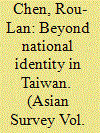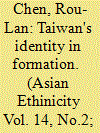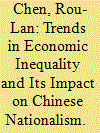| Srl | Item |
| 1 |
ID:
116630


|
|
|
|
|
| Publication |
2012.
|
| Summary/Abstract |
This article conceptualizes the multifaceted concept of national identity in Taiwan. The prevailing measures on national identity were ubiquitous, one-dimensional, and categorical, forcing people to choose between being Taiwanese and being Chinese or opting for independence or unification. Conceptual haziness leaves us ill equipped to examine the essence of Taiwan's identity politics. Hence, this article goes beyond national identity to explore the dimensionality that underlies its nature.
|
|
|
|
|
|
|
|
|
|
|
|
|
|
|
|
| 2 |
ID:
181844


|
|
|
|
|
| Summary/Abstract |
This article builds on the theoretical debate over age, period, and cohort effects (APC) and explores how these factors might affect Taiwan's partisan stability. We conducted a two-level multinomial logit random effects model using survey data from 1991 to 2020 to disentangle the APC effects. Our findings challenge Converse's core assumption that partisanship strengthens with age. As a new democracy, Taiwan's party affiliations remain fluid, and we do find evidence of period effects, particularly associated with cross-Strait crises that favor the DPP. However, generational replacement is the most significant factor driving party identity changes in Taiwan. With generational replacement, the Kuomintang is burdened by the image of a century-old party. The Democratic Progressive Party (DPP) had previously fared better among young cohorts but has recently lost its support from millennials. The youngest generation increasingly refuses to associate with the traditional political parties. It seems reasonable to expect that the new generational forces will restructure the Blue–Green cleavage and expand the ideological diversity of Taiwan's party system.
|
|
|
|
|
|
|
|
|
|
|
|
|
|
|
|
| 3 |
ID:
117936


|
|
|
|
|
| Publication |
2013.
|
| Summary/Abstract |
The formation of Taiwanese identity is a good example to make sense of the theoretical debate between primordialism and constructivism. Based on the two-level multinomial logit results, this paper proves that primordial ethnicity in Taiwan becomes less salient; rather, changing sociopolitical contexts turn out to be the dominant factor in shaping ethnic identity. Specifically, it indicates how the democratic transition has brought about various types of mechanisms, which smoothly disenchant the dominant Chinese identity. As the Taiwanese renaissance emerges to take a leading role in Taiwan's political platform, ethnic identity might be reshaped in accordance with this mainstream Taiwanese ideology. This study also shows that reformation of ethnic identity in Taiwan relies as much on cognition of state boundaries as on the evaluation of political-economic conditions on both sides of the Taiwan straits.
|
|
|
|
|
|
|
|
|
|
|
|
|
|
|
|
| 4 |
ID:
173936


|
|
|
|
|
| Summary/Abstract |
In 2016, the Brexit referendum and Donald Trump’s electoral victory once again brought xenophobic nationalism into the world spotlight. Surprisingly, in the United Kingdom and the United States, a dramatic increase in wealth inequality impelled the working poor to cling more tightly to nationalism. In recent times, China has also witnessed this correlation of resurgent nationalist aspirations and an increasing gap between rich and poor. In light of these international developments, the primary objective of this study is to explore how China’s increasing inequality is influencing Chinese nationalism. The question of whether the Chinese youth who agonize over the trend of wealth inequality has paradoxically grown more attached to Chinese nationalism is also intriguing. Based on structural equation modeling, the estimated results show that, conversely, the increase in economic inequality in China has led to a decline in Chinese nationalism. In particular, disaffected Chinese youth with higher education who suffer from increasing economic disparity have been reluctant to embrace nationalism.
|
|
|
|
|
|
|
|
|
|
|
|
|
|
|
|